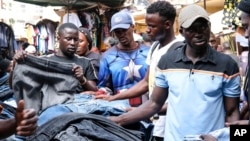Jostling for space, people jam the crowded footpaths crisscrossing a massive open market in Uganda's capital. They are mostly looking for secondhand clothing, sifting through piles or trying on shoes despite getting pushed around in the crush.
Downtown Kampala's Owino Market has long been a go-to enclave for rich and poor people looking for affordable but well-made used clothes, underscoring perceptions that Western fashion is superior to what is made at home.
Discarded by Europeans and Americans, these clothes are often purchased from wholesalers and then shipped to African countries by middlemen. It's a multimillion-dollar business, with some two-thirds of people in seven countries in East Africa having "purchased at least a portion of their clothes from the secondhand clothing market," according to a 2017 U.S. Agency for International Development study, the most recent with such details.
Despite the popularity, secondhand clothes are facing increasing pushback. Ugandan President Yoweri Museveni, a semi-authoritarian leader who has held power since 1986, declared in August that he was banning imports of used clothing, saying the items are coming "from dead people."
"When a white person dies, they gather their clothes and send them to Africa," Museveni said.
Trade authorities have not yet enforced the president's order, which needs to be backed by a legal measure such as an executive order.
Other African governments also are trying to stop the shipments, saying the business amounts to dumping and undermines the growth of local textile industries. The East African Community trade bloc — consisting of Burundi, Congo, Kenya, Rwanda, South Sudan, Tanzania and Uganda — has recommended banning imports of used apparel since 2016. However, member states have not enforced it at the same pace amid pressure from Washington.
President's order spreads panic
In Uganda, the president's order has spread panic among traders, for whom such a ban, if implemented, spells disaster. They hawk used clothes in scores of large open-air markets across the country of 45 million people, at roadside stands and even in shops in malls where it's possible to buy secondhand clothes marketed as new.
The clothes are cheap and drop further in price as traders make room for new shipments: a pair of denim jeans can go for 20 cents, a cashmere scarf for even less.
At one of Uganda's Green Shops, a chain specializing in used clothes, apparel reseller Glen Kalungi shopped for items his customers might want: vintage pants for men and cotton tops for women.
"I am a thrift shopper," he said. "I usually come to these Green Shops to check out clothes because they have the best prices around town."
Kalungi likes to visit on clearance days when he can buy clothes for a fraction of a dollar. Then he sells them at a profit.
The chain, whose owners include Europeans, unveils new clothes every two weeks at its three stores. Some of the items are sourced from suppliers in countries including China and Germany, retail manager Allan Zavuga said.
"How they collect the clothes, we are not aware of that," Zavuga said of their suppliers. "But [the clothes] go through all the verification, the fumigation, all that, before they are shipped to Uganda. And we get all documents for that."
The Green Shops are environmentally friendly because they recycle used clothes in bulk, he said.
Traders group opposes ban
The association of traders in Kampala, known by the acronym KACITA, opposes a firm ban on used apparel, recommending a phased embargo that allows local clothing producers to build capacity to meet demand.
Some Ugandan apparel makers, like Winfred Arinaitwe, acknowledge that the quality of locally made fabric is often poor. Not surprisingly, many people would rather buy used clothing, she said.
"Because it lasts longer," she said.
In Owino Market, a ban on used clothes is inconceivable to many, including some who say they don't think the president's threat was serious.
Abdulrashid Ssuuna, who tries to persuade customers in the market to stop by his brother's used clothing business, said a ban would deny him a livelihood.
"It's like they want to chase us out of the country," he said of the president's order. "From these old clothes, we get what to eat. If you say we leave this business, you are saying we go into new clothes. But we can't afford to go there."




